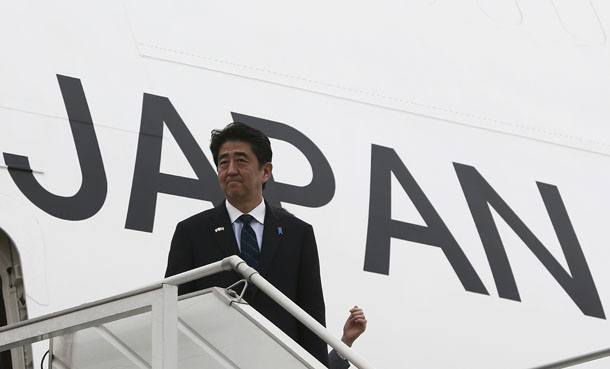TOKYO — Minutes of a recent governing board meeting of Japan’s public broadcaster NHK seem to back up suspicions that Prime Minister Shinzo Abe, despite his denials, is trying to use Japan’s news giant to promote his nationalist agenda.
The minutes, posted on NHK’s website but not widely reported, show conservatives appointed to the board by Abe voicing their opinion on coverage at the Jan. 14 meeting.
One of the four new members favored by Abe proposed that NHK should do more to educate the public about Japan’s territorial claims on islands at the center of a dispute with China, its wartime history as well as the problems with the post-World War II, US-led tribunal that prosecuted Japanese war criminals.
“I think there should be room for programs that provide the most basic knowledge about history and the challenges Japan is faced with,” said Naoki Hyakuta, the author of a bestselling book on a wartime suicide fighter pilot.
Another new board member, Abe confidante Michiko Hasegawa, stressed the need to promote “correct education” for the public.
It’s unclear whether their statements are affecting coverage, and NHK denied any political influence over its editorial decisions. The board members’ comments reflected their personal views, NHK said in a statement, responding to inquiries by The Associated Press.
Hyakuta, according to the minutes, then made sure if it was OK for board members to comment on programming. He was told they can’t make comments that influence specific programs, but they can express their preferences as “personal impressions.” Experts say anything board members say could easily cause compromise and self-restraint in coverage.
“Apparently NHK is leaning toward the government, and increasingly neglecting its responsibility to check authority,” said Yasuhiko Tajima, a media law professor at Sophia University in Tokyo. “I even feel democracy is at risk.”
NHK, the country’s most respected radio and television network, has been buffeted by a series of developments in the past two weeks that have thrust concern over Abe’s influence on the appointments into the headlines.
First, the new NHK Chairman Katsuto Momii infuriated South Korea and China by saying Japan was unfairly criticized for the use of Asian women as military prostitutes, which he argued was common in countries at war.
The board picked Momii to head NHK late last year after his predecessor abruptly announced he would resign, following Abe’s ruling party criticism of NHK’s news coverage as too liberal.
At his inaugural news conference, Momii also said, “We cannot say left when the government says right,” suggesting NHK would be loyal to the government’s policies, including the territorial disputes.
His comments triggered criticism that he contradicted NHK’s mission to serve the public’s interest without bias. Of 12,700 responses from viewers, about 70 percent was critical of NHK, the broadcaster said last week.
Days later, a professor quit an NHK radio program on which he had been a regular guest for 20 years after being told not to discuss nuclear energy before Sunday’s Tokyo governor elections.
The developments are “part of Abe’s plan to achieve his nationalistic agenda,” said Takaaki Hattori, a media and communications professor at Rikkyo University in Tokyo. “As he pushes for stronger military and patriotic education, his nationalism angers South Korea and China, fanning animosity here and helping to drum up support for his agenda. NHK is part of the process.”
The NHK controversy was further fueled last week by public comments attributed to the same two board members who spoke out on programming at the board meeting.
In a speech supporting a conservative Tokyo gubernatorial candidate, Hyakuta said the 1937 Nanjing massacre of Chinese civilians and disarmed soldiers by Japanese troops was a fabrication. He also accused the US forces that occupied Japan after the war of brainwashing the population with a self-denigrating view of Japan’s wartime history.
Two days later, the Japanese newspaper Mainichi revealed that board member Hasegawa, a professor of Japanese culture, had written an essay last fall praising a right-wing extremist who committed suicide in 1993 to protest a liberal magazine article.
Abe acknowledged that the four new board members are his trusted people, but denied any intention to exercise influence over NHK. The four joined the board as part of its partial membership renewal.
The 12-member governing board, which approves NHK’s budget, is made up of outside experts, including academics and business leaders, and their ties with ruling lawmakers often raise eyebrows. Board members must be approved by parliament and the prime minister.
Experts say political influence is a longstanding problem at NHK. The broadcaster was criticized for altering a 2001 program on wartime Japanese sex slavery, allegedly after Abe and another ruling party lawmaker complained, although both sides denied political pressure caused the change.















